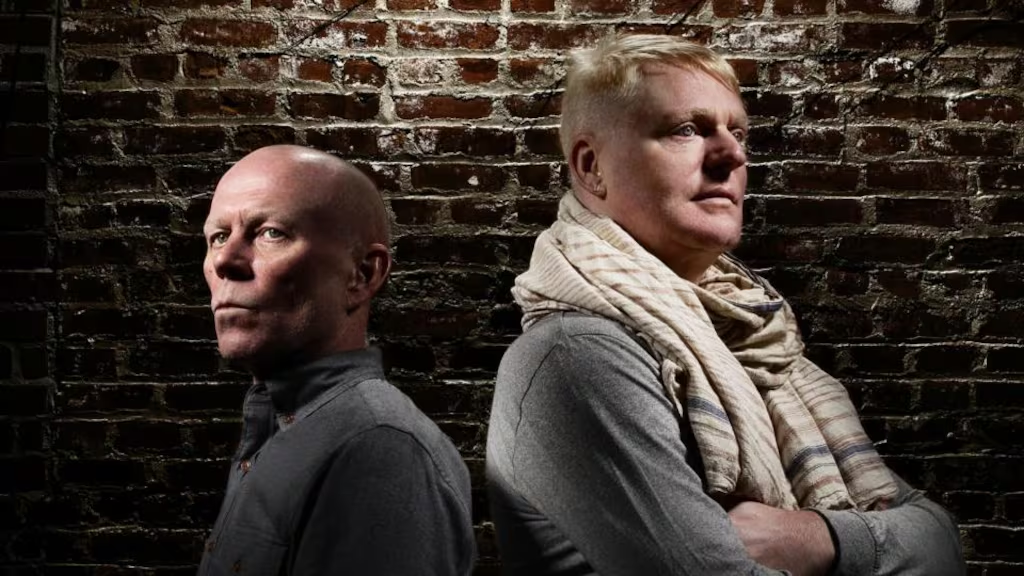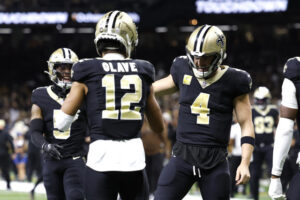
BREAKING NERWS : The Erasure Singer In Erasure Andrew Ivan Bell Has Said The Is No Large Music In Erasure Due To ……..
BREAKING NEWS: Erasure’s Andy Bell Reveals Why There Was No “Large” Music in Erasure
In a groundbreaking interview, Andy Bell, the iconic lead singer of the electronic duo Erasure, has opened up about the evolution of the band’s sound and why Erasure never ventured into “large” or orchestral music, despite their long and successful career. Bell, known for his distinct voice and charismatic stage presence, suggested that the band’s reluctance to create grandiose music was largely due to their deep commitment to the electronic pop genre and the creative dynamics between him and his long-time musical partner, Vince Clarke.
Erasure, formed in 1985, became one of the most influential acts of the 1980s and ‘90s electronic music scene, delivering hits like “A Little Respect,” “Always,” and “Chains of Love.” Their signature sound, defined by infectious synth-pop melodies, catchy hooks, and Bell’s soaring vocals, cemented them as staples in the New Wave and synth-pop movements. However, in this recent interview, Bell confessed that the band’s music, despite its wide popularity, never took on a “larger” or more orchestral form, as was seen with other contemporaneous artists, such as David Bowie or even Depeche Mode later in their careers.
Bell explained that the absence of “large” music in Erasure’s discography was primarily due to their deep-seated commitment to electronic-based music. “Vince and I have always been about minimalism,” Bell said. “We love the idea of creating powerful songs with just the right amount of sound. Adding orchestras or going in a more grandiose direction never really felt natural for us.” Bell pointed out that the duo’s creative philosophy has always revolved around simplicity and precision within the electronic genre. The use of synthesizers, drum machines, and sequencers was the core of Erasure’s music, which allowed them to craft emotive and deeply resonant songs without the need for larger, more traditional instrumentation.
The dynamics between Bell and Clarke, as the core members of Erasure, also played a role in shaping the band’s sound. While Bell’s flamboyant, theatrical vocal style often led to emotionally charged performances, Clarke’s preference for electronic minimalism and crafting songs with streamlined arrangements stood in contrast to the notion of “larger” music. Bell confessed that while he would sometimes dream of pushing the band in a more expansive direction, he always respected Clarke’s more focused, electronic-based vision. The two of them, Bell said, never had the desire to work with orchestras or other massive sonic structures, preferring to keep things concise, accessible, and focused on their love of synth-based pop.
Interestingly, Bell acknowledged that there were moments in Erasure’s career when they experimented with lush arrangements. For example, on tracks like “Who Needs Love Like That” and “The Circus,” there are hints of more complex arrangements. However, Bell emphasized that the essence of Erasure’s sound—what made the duo so distinctive—was the minimalist approach, the blend of dance beats and emotional vulnerability, and the use of synthesizers to create evocative atmospheres.
Bell also remarked that while Erasure never pursued “large” music, the duo has always embraced innovation and change. Over the years, they have continued to evolve their sound, from the early electro-pop of their debut Erasure album to the more experimental textures of later works like The Violet Flame and World Be Gone. Even without turning to traditional orchestral arrangements, Bell believes the band’s music has always been dynamic and full of emotional weight.
Ultimately, Andy Bell’s comments reveal a deeper understanding of Erasure’s artistic direction and the principles that have guided their nearly four-decade-long career. While Erasure may not have ventured into “large” or symphonic music, the duo’s impact on the electronic music world has been immeasurable. Their ability to craft intimate, synth-driven anthems has given them a lasting legacy, one that continues to resonate with fans old and new.





